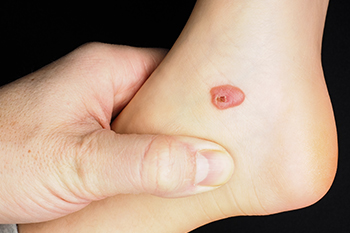
Blood blisters on the feet and toes can result from various factors, including sustained pressure or friction on the skin without breaking the skin’s surface. This is common in activities like running, dancing, or wearing ill-fitting shoes. Blood blisters look like friction blisters, but are filled with blood instead of clear fluid. They may appear red, purple, or black. While blood blisters may look scary, they are generally common and not usually a cause for alarm. Treatment typically involves allowing the blister to heal naturally over one to two weeks, with the formation of new skin beneath the blister. It's essential to protect the blister during this time, possibly by applying a bandage or similar protective covering. Prevention strategies to avoid developing blood blisters on the feet or toes include well-fitting footwear, protective gear during activities, and moisture-wicking socks to reduce sweat and friction. If the blood blister becomes painful or shows signs of infection, it is suggested that you make an immediate appointment with a podiatrist.
Blisters may appear as a single bubble or in a cluster. They can cause a lot of pain and may be filled with pus, blood, or watery serum. If your feet are hurting, contact Lance Greiff, DPM of Great Neck Podiatry. Our doctor can provide the care you need to keep you pain-free and on your feet.
Foot Blisters
Foot blisters are often the result of friction. This happens due to the constant rubbing from shoes, which can lead to pain.
What Are Foot Blisters?
A foot blister is a small fluid-filled pocket that forms on the upper-most layer of the skin. Blisters are filled with clear fluid and can lead to blood drainage or pus if the area becomes infected.
Symptoms
(Blister symptoms may vary depending on what is causing them)
- Bubble of skin filled with fluid
- Redness
- Moderate to severe pain
- Itching
Prevention & Treatment
In order to prevent blisters, you should be sure to wear comfortable shoes with socks that cushion your feet and absorb sweat. Breaking a blister open may increase your chances of developing an infection. However, if your blister breaks, you should wash the area with soap and water immediately and then apply a bandage to the affected area. If your blisters cause severe pain it is important that you call your podiatrist right away.
If you have any questions, please feel free to contact our offices located in Great Neck Bronx, NY . We offer the newest diagnostic and treatment technologies for all your foot care needs.
